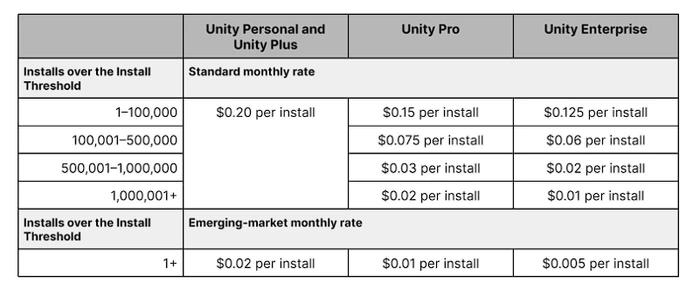If you are considering learning game design to build your very own indie titles and were considering learning how to use the Unity games engine. It might be worth taking note of the new Unity pricing structure that is been rolled out recently causing upset amongst existing games developers. Unity explains more about their new pricing structure, learn more for yourself over on the Unity website.
“We are introducing a Unity Runtime Fee that is based on each time a qualifying game or app is downloaded by an end user. When a Unity game or app is downloaded, the Unity Runtime is also installed. The Unity Runtime is code that makes the project work performantly, at scale, across dozens of Unity-supported platforms.
Unity Personal, Unity Plus, Unity Pro, and Unity Enterprise plan subscribers and Unity Runtime distributors will be responsible for paying the Unity Runtime Fee, which is calculated on a per-project basis. The fee applies to all platforms (mobile, PC, console, streaming, etc.) and is based on the number of installs once an app reaches eligibility thresholds.
Unity Runtime Fee rates
Games or apps qualify for the Unity Runtime Fee after two criteria have been met: 1) the game or app has passed a minimum revenue threshold in the last 12 months, and 2) the game or app has passed a minimum lifetime install count. The fee schedule for each install is based on a set of tiers that is a progressive schedule. Each install within a tier is charged at the per install rate listed. For example, a Unity Pro user with an app that exceeds the Unity Runtime Fee threshold and has 200,000 installs in the month will pay 100,000 * $0.15 + 100,000 * $0.075 = $22,500.”
New Unity pricing explained
In the world of video game development, Unity has long been a favored engine due to its user-friendly nature and its capacity to support a diverse range of games. However, recent changes to Unity’s business model and pricing structure have sparked a wave of discontent among developers, leading to a significant shift in the industry’s perception of the platform.
Unity’s reputation has been built on its ease of use and versatility. However, over time, the quality of the engine and its features have seen a noticeable decline. The “LTS” version, touted as a stable release, has been plagued by crashes due to an unresolved error, causing frustration among developers who rely on the platform for their projects.
The discontent among developers was further exacerbated when Unity announced changes to its pricing model. The new model includes a flat fee for every game installed and a subscription fee for professional developers. This shift in pricing strategy has been met with widespread criticism, with many developers viewing it as costly and burdensome, particularly for those selling games at lower prices.
The new pricing model also poses a significant challenge for developers who wish to participate in charity bundles. The cost structure makes it financially unfeasible for them to do so, thereby limiting their ability to contribute to charitable causes through their work. Adding to the uncertainty, Unity has reserved the right to change its fee without a minimum cooldown period. This has raised concerns about unpredictable costs, making it difficult for developers to plan their budgets effectively.
2023 Game engine prices explained
The changes to Unity’s business model and pricing have led to a significant loss of trust among developers. Some have gone as far as advising against using Unity for new game projects, a stark contrast to the platform’s once favorable reputation.
Developers who are already using Unity for ongoing projects find themselves in a particularly challenging position. They are locked into the new pricing model, even if they did not agree to it when they started their projects. This has led to a sense of betrayal among developers, who feel they did not sign up for these changes and have no option to opt out.
The changes are expected to have a profound impact on the budgets of games that have been in development for years. Developers are being automatically switched to a more expensive subscription plan unless they cancel their subscription, adding to the financial strain.
Source : Unity
Filed Under: Gaming News, Technology News, Top News
Latest TechMehow Deals
Disclosure: Some of our articles include affiliate links. If you buy something through one of these links, TechMehow may earn an affiliate commission. Learn about our Disclosure Policy.

